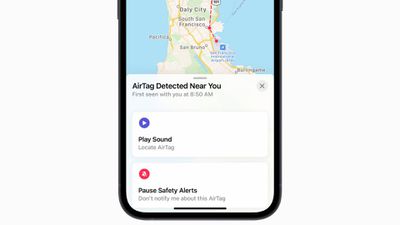Apple has shared considerable information regarding the safety mechanisms in place within its Find My network and AirTags, that prevent unwanted tracking. One of the biggest measures is the ability of an iPhone to detect if an unknown AirTag has been following a person for a period of time. In the unfortunate event that does occur, the iPhone can display an alert.

AirTag is joining an already crowded market, with Tile and other companies that have already produced item trackers for the last couple of years. So the challenges Apple faced with developing AirTag aren't entirely new. However, Apple's entry into a market typically leads to increased scrutiny over the real-world implications of the products and services.
Since their announcement earlier this month, Apple has played a fine balancing act in being transparent about the mechanisms in place within AirTags and the Find My network while ensuring not enough information is public for possible stalkers to find ways to exploit the system. Apple has publicly said that a user's iPhone can detect if an AirTag, unassociated with that iPhone, is found to be tracking it over an "extended period of time."
Apple hasn't gone into further detail until now. In a statement to Fast Company, regarding concerns about how AirTags could be used for unwanted tracking, Apple says that the iPhone alert for an unknown AirTag will be triggered once a user arrives at either their home address or a location the iPhone has learned to be frequently visited.
Apple has built some protections into this system. If you are an iPhone user, for instance, and someone has placed an AirTag on your person, your phone will eventually alert you that an AirTag that isn’t yours has been found “moving with you.” Apple didn’t clarify how quickly or often this alert will arrive, but it did share that it will occur when you arrive at your home (the address stored in your Apple “Me” card) or at certain other locations that your phone has learned you frequent over time. Apple declined to disclose further specifics, citing the interest of public safety.
While not entirely clear based on the statement and report, if a user is, for example, traveling and not at their typical home address, the iPhone will still likely send an alert after a certain period of time, which has yet to be disclosed. The home address trigger, described by Fast Company, is likely not the first metric the iPhone will use to alert a user, but rather a safeguard in place in case the "extended period of time" has elapsed without an alert.
AirTags, alongside the purple-colored iPhone 12 mini and iPhone 12, will begin arriving to most customers today. It's certainly possible that Apple could provide more specifics on the iPhone alert, especially regarding the trigger for when a user arrives home. For example, if a stalker was tracking an iPhone user with an AirTag, and they're only alerted to the fact when they arrive home, the stalker would presumably already have their home location, based on the report from Fast Company.
We've reached out to Apple for more clarity around the alert and home address trigger and will update this post if we hear back.























